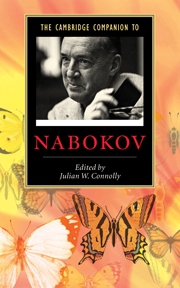5 - Nabokov and modernism
from Part I - Contexts
Published online by Cambridge University Press: 28 May 2006
Summary
Modernism - or as Peter Nicholls has emphasized, “modernisms” - was a tangled web of international but mainly Western movements of literary innovation in the early twentieth century, especially from 1900 to 1930. Nabokov himself rarely used the term, which only came to dominate English-language criticism around 1960; and any account of his affinities with modernist attitudes in literature must begin by allowing for his resistance to all such historical labels. Sweeping generalizations about periods and styles were, after all, a stock-in-trade of Soviet literary policy as it promoted “socialist realism” from the 1930s onward. This doctrine routinely led to attacks on Nabokov's “top favorite” novelists from abroad (notably Flaubert, Joyce, Kafka, and Proust), and also resulted in the official exclusion of his own writings from Russia until Gorbachev and the glasnost of the 1980s. Even worse, these cultural policies blocked the careers and ruined the lives of many twentieth-century Russian writers, especially (for Nabokov) Osip Mandelshtam (1891-1938). This gifted poet graduated from the same progressive school in St. Petersburg that Nabokov later attended, and his death in a Siberian labor camp warned of the novelist's own probable fate had he not left for the West in 1919. Both Nabokov's intense dislike for literary “-isms” and the Soviet background for this hostility burst forth in one of his “strong opinions” of the 1960s, in which he expressed “helpless shame” at the thought of Mandelshtam having to write “under the accursed rule of those beasts” (SO, 58).
- Type
- Chapter
- Information
- The Cambridge Companion to Nabokov , pp. 85 - 100Publisher: Cambridge University PressPrint publication year: 2005
- 12
- Cited by



